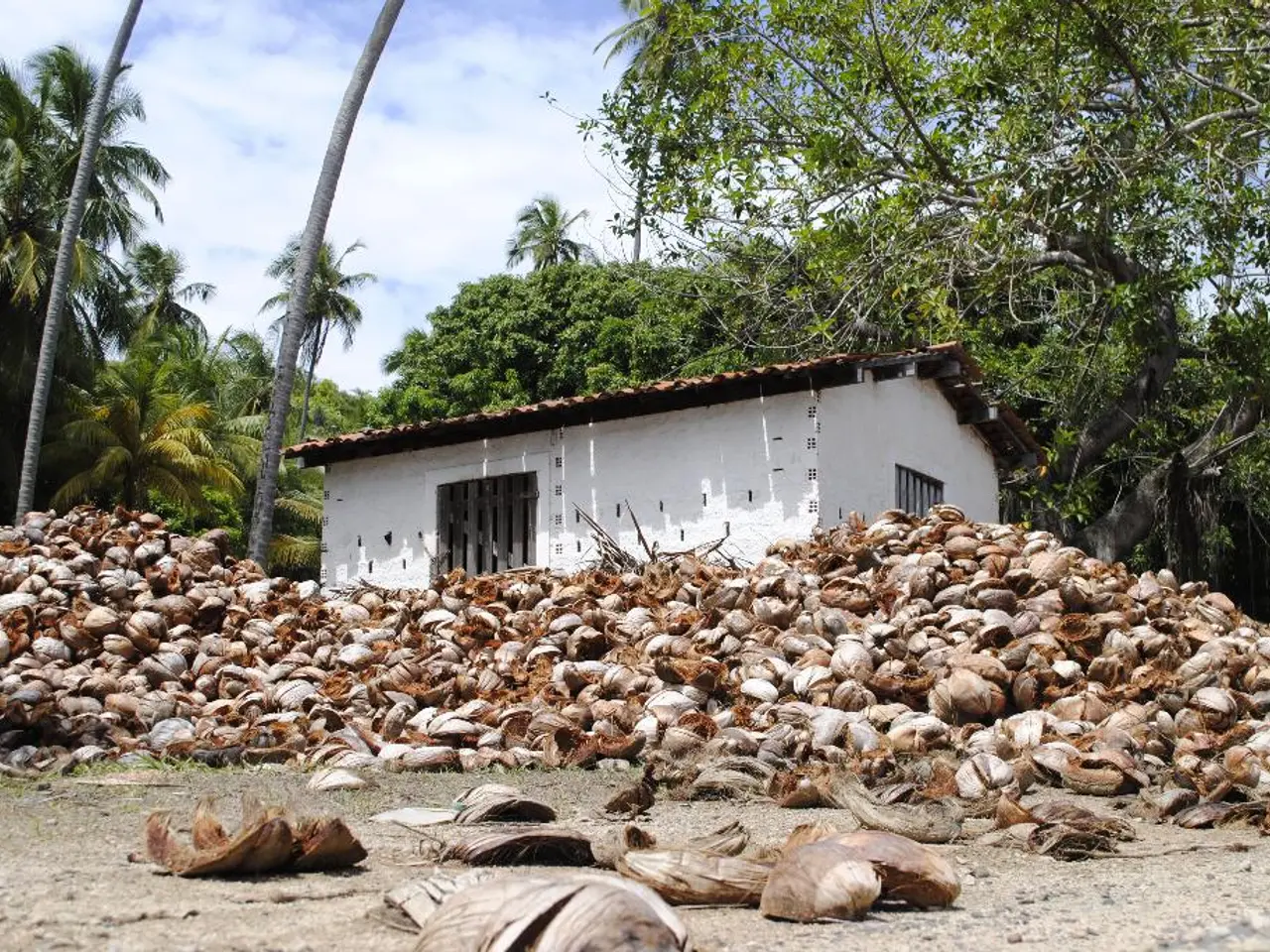Coconut Fiber (Coir): Understanding Its Nature and Application Methods
Coconut coir, also known as cocopeat, is quickly becoming a popular choice for gardeners and farmers alike due to its numerous benefits and eco-friendly nature. This innovative growing medium is derived from the fibrous husk of coconuts, making it a sustainable and renewable resource[1][2][4].
One of the key advantages of coconut coir is its exceptional water retention properties. It can hold up to 10 times its own weight in water, significantly reducing the need for frequent watering and ensuring consistent hydration for plants[1]. This makes it an ideal choice for growing delicate seedlings that are susceptible to mold and fungus[6].
The soft texture of coconut coir also improves soil quality by enhancing aeration around plant roots. This allows roots better access to oxygen and nutrients, promoting healthier root systems and overall plant growth[2][4]. Moreover, coconut coir is naturally pH neutral, with a range of 5.0 to 7.0, making it suitable for most vegetables and many other plants[3]. It can help balance out acidic or alkaline soils, making it a versatile amendment to various soil types.
Coconut coir's versatility extends beyond traditional gardening. It is used in various settings, from raised beds and container gardening to large-scale organic farming[2][3][4][5]. It can even be used in hydroponic setups for indoor plants[7].
Coconut coir is also resistant to diseases, including fungal pathogens and mold, promoting healthy plant growth[6]. It can be reused multiple times and takes a while to break down[8]. Coco chips, a stable blend of pith and fiber, are helpful for seed starting and retaining moisture while creating air pockets in the growing medium[9].
However, it's important to note that coconut coir is inert and has no nutrients, so it requires the addition of nutrients for plant growth[10]. Coco fiber, another form of coconut coir, improves porosity and drainage in garden soils and potting mixes[9].
In summary, coconut coir is valued for its environmental benefits, excellent moisture retention, soil enhancement properties, balanced pH, and versatility in supporting healthy plant development across many gardening applications. Its sustainable production, renewability, and resistance to diseases make it an attractive choice for environmentally conscious gardeners and farmers.
[1] https://www.sciencedirect.com/science/article/pii/S0925857416308107 [2] https://www.sciencedirect.com/science/article/pii/S001670291500252X [3] https://www.sciencedirect.com/science/article/pii/S0016702916301161 [4] https://www.sciencedirect.com/science/article/pii/S0308521X17302246 [5] https://www.sciencedirect.com/science/article/pii/S0016702918302648 [6] https://www.sciencedirect.com/science/article/pii/S0016702917306273 [7] https://www.researchgate.net/publication/326638729_Coconut_Coir_as_a_Hydroponic_Growing_Medium_for_Indoor_Plants [8] https://www.researchgate.net/publication/326638729_Coconut_Coir_as_a_Hydroponic_Growing_Medium_for_Indoor_Plants [9] https://www.sciencedirect.com/science/article/pii/S0016702916301161 [10] https://www.sciencedirect.com/science/article/pii/S0016702916301161
- The popularity of coconut coir, also known as cocopeat, has extended to the realm of houseplants, offering a decorative solution while promoting healthy plant growth.
- In the world of fashion-and-beauty and home-and-garden, emissions-conscious consumers are opting for organic vegetables from garden beds filled with compost and enriched with coconut coir.
- The harvest from a garden using coconut coir will not only nourish the soul but also contribute to a sustainable and eco-friendly lifestyle.
- Coconut coir's exceptional water retention properties and pH neutrality make it the perfect medium for sprouting seeds and cultivating a wide variety of flowers.
- By blending coconut coir with traditional soil, gardeners can create a mix that improves aeration around root systems, supporting the growth of stronger and healthier plants.
- In the realm of home-and-garden, coconut coir has shown promising results in combating soil acidity and alkalinity, fostering a more balanced environment for plants to thrive.
- The versatility of coconut coir in gardening applications extends beyond traditional farming and gardening, setting a new standard for sustainable, eco-friendly, and healthy plant development.







